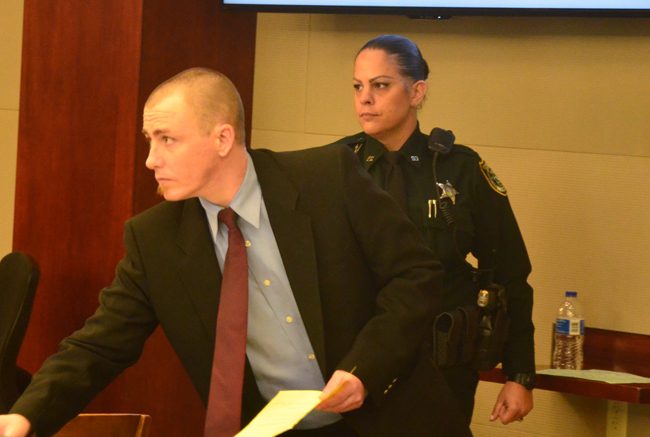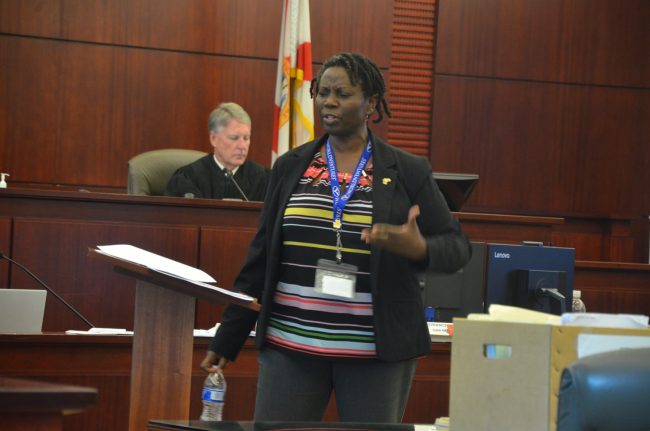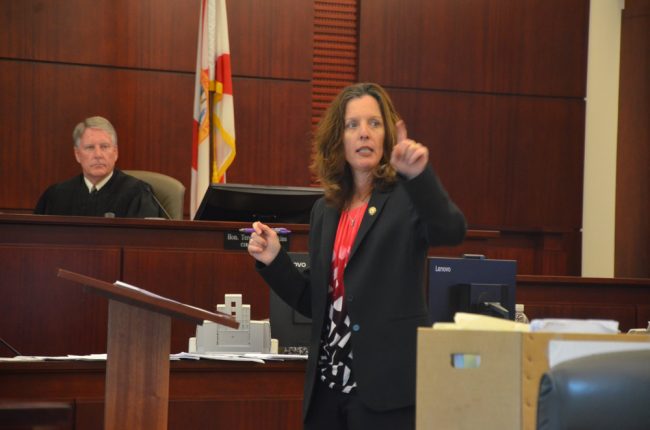
A jury of five women and one man this afternoon found Michael Wilson not guilty of premeditated attempted murder at the end of a four-day trial this afternoon. The jury deliberated two hours and 40 minutes and at one point submitted eight questions before rendering a verdict that acquits the former Palm Coast resident of trying to electrocute his wife, finding him guilty on two lesser charges.
The jury found Wilson guilty of simple attempted battery and grand theft, the first a misdemeanor, the second a third-degree felony that exposes him to a maximum of five years in prison. He’s already served a year and a half, awaiting trial. His Aug. 2 sentencing may result in some additional incarceration, but it is possible that he could avoid state prison time.
Wilson around Christmas 2017 had rigged the entry door to his home in Palm Coast’s W Section with electrical current at the same time that he’d had a falling out with his wife: he accused her of cheating on him, of conceiving what would have been the couple’s second child, with another man, and of stealing his money to pay her child-support bills. Wilson’s wife was about 20 weeks pregnant when, according to the prosecution, he attempted to kill her.
The jury had to decide if his acts were premeditated (attempted first-degree murder), though it could also choose to convict him on lesser charges of attempted second-degree murder or attempted manslaughter–or acquit him outright. After submitting eight questions about 90 minutes into deliberations, the jury went with acquittal on the most serious charge, a lesser charge of battery instead of aggravated battery, and the grand theft finding.
Some of the questions revealed inattention, poor comprehension or a misunderstanding of its task on the jury’s part, such as questions about the defendant’s criminal past, which had been explicitly addressed at closing, and a question about nonexistent evidence. More alarmingly, the jury asked questions that were far afield from the evidence submitted, such as wondering whose name was on the lease of the home Wilson rented and what the distance was between Wilson’s home and his in-laws. The questions appeared to raise concernms for the judge, who, in an audibly admonishing tone, told the jury “there are no other laws” to apply but those outlined in detailed jury instructions. The questions revealed an almost adlibbing jury prone to grasping for evidence rather than analyzing evidence at hand—never a good sign for either side. In this case, it favored Wilson. The questions were precursors of the verdict.
The split verdict was odd for essentially exonerating Wilson of trying to kill his wife, but not exonerating him of trying to hurt her–but just not hurt her much.
The verdict was split in another odd way: it suggested that the jury did not find Wilson’s acts within his own home questionable. He could rig the entry door for what the jury saw as self-defensive reasons, but he could not take a gun he’d found above his own kitchen range.
Wilson and his wife had become estranged at the end of that November after he was fired from the company owned by his wife’s in-laws in Palm Coast. The couple had agreed to spend Christmas at the wife’s parents’ home in Tennessee. During that time, Wilson secretly drove the nine hours back to the Palm Coast home on Dec. 23, rigged the door, took the gun from the house, and drove back to Tennessee to, in his word, “celebrate” Christmas with the family.
He was arrested in Tennessee two days after Christmas after his Palm Coast in-laws uncovered the electrocution device with sheriff’s deputies, and before Wilson’s wife had made it back to the county. Wilson in Tennessee was charged with felony meth possession, and eventually convicted on that charge.

Why Wilson was scared of an intruder was never made clear and could not be made clear to the jury since his mental state was inadmissible. The inference was that he was paranoid, though Assistant State Attorney Melissa Clark told the jury in her final closing argument that he’d misleadingly claimed he was protecting himself against his own in-law.
The four-day trial (including a day of jury selection) had unraveled a tangle of anger, jealousies, resentments, accusations, threats of legal action and other maneuvers stemming from a deteriorated marriage, and of ill feelings that had spread to the relationship between Wilson and his Palm Coast in-laws, particularly his boss, whom he claims ordered him out of town. The family members all testified, rallying around the wife’s story. Wilson was the only witness to testify for the defense, in his own defense, a long testimony that stretched over two days. He spoke sharply and unemotionally throughout, a deadpan demeanor that contrasted with his attorney’s often visible mix of indignation and exasperation: Nunnally had been backed against the wall by the judge’s rulings and seemed disarmed well into the trial, though she could always rely on her vivid, at times a shade manic, closing to sway the jury. She did, and it worked.
She credited the jury for perhaps sensing that what had been inadmissible in court (Wilson’s mental state) had played a role in his behavior even as she recognized the oddness of the split verdict. “Sometimes juries, they don’t feel comfortable doing one thing so they’ve got something else they can do, it’s like almost an out,” Nunnally said in a brief interview afterward. “It’s almost weird because if you think he attempted to batter his wife, then why would you think he wouldn’t attempt to kill her. So I guess from the fact that one is more of a–OK, a shock, versus, he ain’t trying to kill her.”
For all the exclusion of Wilson’s mental health issues at trial, those elements will all be part of his sentencing hearing. That could mitigate the sentence. “So he may score prison, he may not. He might be close to it, he might be a little bit over,” Nunnally said.
Nunnally also provided a perspective on the in-laws and his wife that had not come out at trial: in depositions, she said, “they didn’t give me the impression that they wanted to see the worst. As a matter of fact when Ashley was talking to him on the jail call,” she said, referring to his wife, “she kept saying, ‘tell them that you were crazy, tell them that you’re schizophrenic, tel them tell them tell them,’ so it didn’t seem like they were out to get him, and that’s not the impression I got at all, but you know, things change over time.” But the family knew about his mental health issues, the attorney said, “and none of us could talk about it.”
“And the jury isn’t going to hear what really happened. That’s what bothered me so bad,” Nunnally continued. “I said God, this ain’t right. They need to know what really happened, but they can’t because the law restricts it.”
Before trial the state had offered Wilson a deal: 10 years in prison. He declined. “We went with what we had,” Nunnally said. “It’s a miracle.”
A more than hour-long video of his interview with an investigator in Tennessee, shortly after his arrest, could have damaged his case most with the jury: Wilson clearly lied again and again even as a seemingly indulgent investigator was extending him various ways to own up to what he had done at the Palm Coast home, or even to admit that he had been inside the home. At every turn, Wilson denied it. At first he claimed he’d not been to Palm Coast around Christmas.
“I’ve been in Ohio and I’ve been in Tennessee since I left. I haven’t been in Florida since the beginning of all this, all this happened,” Wilson said.

“I did not go to my house on that weekend,” Wilson persists, then soon owns up to driving down and back, but not going in the house. Then Wilson played coy.
The investigator: “Did you go to the house?”
Wilson: “Maybe.”
The investigator: “Sometime we do some shit we’re not thinking straight. So you did go to the house.”
Wilson: “I went to the garage.”
The investigator: “I’m spending some time with you because they’re telling me you did more than that in your house.”
Wilson: “Like what?”
The investigator: “Like you set a trap for your wife.”
Wilson: “No.”
The investigator: “Did you go inside?”
Wilson: “No.”
The investigator: “I mean, even to pick up, you forgot something?”
Wilson: “There wouldn’t be a single piece of clothing left on the hangers if I’d gone in there, I assure you.”
The investigator: “So you’re telling me you didn’t have anything to do with this?” The investigator spreads out pictures of the electrocution contraption Wilson had devised, and which by then he’d owned up to installing himself, on the stand, to the jury, not taking into account the video from Knoxville that the prosecution held back until the end.
“No,” Wilson says again. The investigator asks him again: “You’re telling me you had nothing to do with this.”
“Hell no,” Wilson said.
His attorney’s highly animated closing went as far as ridiculing the claims against Wilson. Nunnally dwelled as little as she could on the interview with the investigator. “He wasn’t forthright with the investigator because he was afraid of other things,” she told the jury. “He wasn’t hiding anything about being in Florida.” That statement became true in the course of Wilson’s interrogation with the investigator, but had not started off that way–not even by Wilson’s own admission.
“Things had to have happened perfectly for Ashley to be the one to get hurt, and that’s just going out of the way to do that to one person who’s right there with you,” Nunnally told the jury–unless, the attorney said, the wife wasn’t the intended target.
To Clark, the assistant state attorney, the case against Wilson, beside the hard evidence, came down to this: “He’s just not believable.”
“The defendant was done with his wife, you could see it in his text messages,” Clark told the jury. “He believed she was having an affair, he believed that baby wasn’t his.” But he had the couple’s one and a half year old daughter, and he wanted to keep her. He came up with a plan. “He set up that device for one reason: because he was done with his wife.” And when his wife drove down to Palm Coast after Christmas with her daughter, the prosecutor explained, Wilson attempted to have her arrested on a claim that she had left without his permission, but, in fact, to ensure that his wife would be opening the electrified door by herself, not while she was holding the little girl.
The jury went with Nunnally’s version.
Wilson’s ex-wife, her mother and her step-father were watching from the first row when the attorneys delivered their closing arguments, and when the verdict was delivered. Wilson was not seen looking in their direction. Immediately after the verdict, Wilson’s ex-wife broke down in sobs and continued sobbing almost uncontrollably as her family helped her out of the court room. Wilson maintained the same unemotional demeanor he had kept up throughout the trial.





























Steve says
Low life eacapes true Justice again. Not enough time left on a Nuclear Clock for Alleged to be in prison.
Concerned Observer says
Un freakin Believable!
Trailer Bob says
Incredible! What was the IQ of the jurors? Setting up a doorknob to electrocute someone was obvious from the pictures. We really need to get our courts and judges straightened out in the county.Soon we will be know as ” the perfect place to kill your spouse”.
Agkistrodon says
que the banjos……….
Outside Looking Out says
Flagler county, the perfect place to commit or attempt to commit a crime.
The perfect place to rape a 13 yr old autistic child and get probation.
The perfect place to attempt to murder your wife.
Same judge.
Keep this in your mind the next election that Terrence Perkins runs in.
ASF says
The guy is a pretender and he’s good at it. Hes the type of guy that presents himself as having “suicidal ideation” in the ER coincidentally one or two days before a court date. Until he kills an innocent member of the public with his antics, he will probably continue his behavior because not enough people realize he is, in fact, a sociopath and exploiter and abuser of other human beings…and there is no “cure” for that.
Concerned Citizen says
Once again our luaghable justice system has failed us.
It’s a bad day in court when a State Attorney gets defeated by a Public Defender. Although most of them can’t even do a proper job regardless of who’s defending. This county has Judges and Jurors that either don’t care or have more sympathy towards criminals. Eitherway if you committ a crime in Flagler getting arrested won’t mean much.
Ben Hogarth says
It’s so terribly tragic that full justice cannot occur because we have a jury that simply could not piece together the evidence presented. The questions they submitted had little relevance to the question as to guilt – it illustrates a severe lack of comprehension on their part.
I often wonder if prosecutors do not spend enough time educating each jury in their arguments. Most people are simply not educated enough in the legal system to be reliable when it comes down time to answer the question of “pre meditation” and intent on the guilty party. We need justice reform nation wide. Just add this one to the list of jury failures.
Realist says
Let me tell you about public defenders. I hired a private attorney because my son begged me. The attorney was useless and a waste of money. The charges were pretty much garbage and I wish I had stuck with the public defender.
Optimist says
Aww, that’s cute .. Good for him!! Adorable. at least he didn’t get charged and convicted of attempted murder of.. well, “anybody that touched that doorknob.” I guess the intended recipient is hard to prove. He will remain a scumbag tho.. for eternity. Shocking! He should be banned from “Harbor Fright Tools” forever….
ASF says
Karma dictates that one of the members of the jury find THEIR daughter, sister or grand-daughter hooking up with this loser.